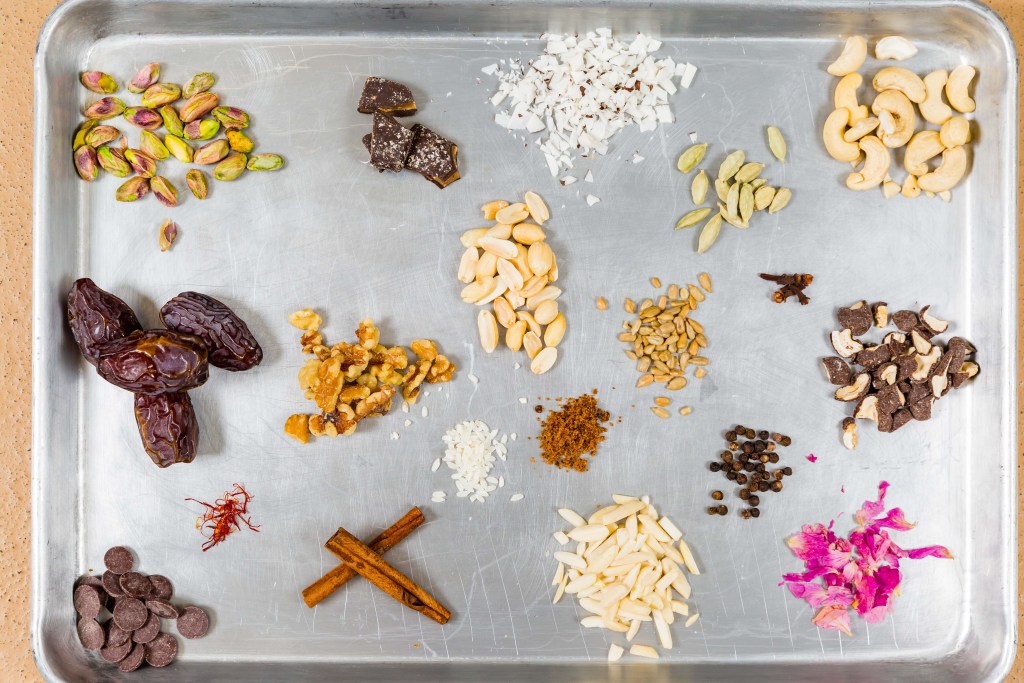“Culture and flavors transcend borders,” says Shafna Shamsuddin. It’s an ethos that has guided Shamsuddin in her frozen desserts business, Elaka Treats, since founding it in 2019.
The term “frozen dessert” encompasses a general range of cold, refreshing sweet treats—ice cream, sorbet, frozen yogurt, gelato. The U.S. Department of Agriculture website gets more granular for ice cream, specifying that it must “contain not less than 20 percent total milk solids, consisting of not less than 10 percent milkfat.” Some Elaka Treats products qualify as ice cream, but due to the nontraditional ingredients Shamsuddin also incorporates into her recipes, others don’t. She’s adopted a simpler term: “frozen desserts.”
Though each Elaka Treats recipe contains a unique base, the process of creating each flavor is the same. Each mix gets churned, and, similar to gelato, less air is incorporated than in ice cream, creating a noticeably denser product.
Elaka Treats began operations at the Piedmont Food Processing Center in Hillsborough in 2019, and Shamsuddin got her start selling the product at Triangle farmers’ markets. She’s since moved production to Greensboro, focusing on wholesale.
In her time selling between the Triangle and Triad, Shamsuddin says she’s picked up on certain distinctions between audiences. In the Triad, customers “lean a little more towards flavors that are familiar,” whereas in the Triangle, customers tend to be more open to new experiences, she says, perhaps thinking: “I want to experiment. Let’s see what this really weird-sounding flavor is.”
Still, once Greensboro customers try zanier flavors like zucchini orange blossom, pineapple hibiscus, or green apple cumin, they’re usually won over. “It’s just a matter of convincing them,” Shamsuddin says.
The culinary entrepreneur is still developing innovative new ways to market her product, in addition to wholesale operations. Earlier this year, she launched one such concept, Elaka Pods, at the ArtsCenter in Carrboro.
Shamsuddin describes the contraption as an ice-cream vending machine—a small self-service merchandiser freezer containing a medley of pints, ice-cream sandwiches, and single-serving frozen treats, accompanied by an iPad and card reader. A portion of sales goes to a scholarship fund for The ArtsCenter’s after-school programming.
“I’ve been having this idea for a very long time,” Shamsuddin says of her partnership with The ArtsCenter, “but it’s not every day that somebody is willing to let you use them as guinea pigs.”
An intuitive touch
Shamsuddin immigrated to the United States from the United Arab Emirates in 2001 for college, receiving her degree in psychology and earth science. She planned to pursue more degrees, but due to personal circumstances, those dreams fell by the wayside.
“I took a break and truly became a housewife, which I have to say was probably the most intense thing I did,” says Shamsuddin, noting that the experience was isolating: “Loneliness settled in.”
During this time, she began slowly building the company groundwork.
“One day I was homesick and lonely, and craving a plantain dish that’s steamed plantain stuffed with fillings like coconut, cardamom, and cashew, and we deep-fry it,” she says of one flavor. “It’s a delicacy that just melts in your mouth when you bite into it. We have it at teatime, and teatime is a big deal in Asian culture, in the Middle East, as well as in India, where family members just get together to sit and chat, and have tea and snacks.”

“I was just missing that whole experience and the delicacy itself,” Shamsuddin says. “All of a sudden, it hit me, instead of making the whole delicacy, which is a labor of love, I thought, ‘Why don’t I just create an ice-cream version of it?’ That way it’s always there in the freezer.”
Shamsuddin credits her parents for nurturing her approach to making food, and says that her technical, intuitive approach to cooking comes from her mother, while she has inherited creativity and curiosity from her father, who passed away a few years ago.
“My mom, the way she operates in a kitchen, it’s amazing,” she explains. “She’s able to understand her ingredients, her process, her setup, everything on a very logical and on a very molecular level.”
“[My father] was a foodie, even before becoming a foodie was a thing,” Shamsuddin continues. “It wasn’t common when I was a kid for people to go out and eat every week to try new things, new flavors, new cuisines. People tend to only stick with what they’re familiar with. Whereas my dad was always experimental.”
Shamsuddin’s unique background and upbringing are at the heart of her approach to food and business. You can find Elaka Treats at The ArtsCenter, as well as at the Durham Co-op Market and Vimala’s Curryblossom Cafe, among other local businesses.
Several years ago, as a new Elaka Treats customer, I responded to a feedback form for a new flavor that Shamsuddin had sent out to customers. The flavor, Sulaimani Sorbet, is inspired by Sulaimani tea, popular in the Malabar region of Kerala, and is made of Black tea sorbet, lemon, and cardamom. I said it tasted familiar and nostalgic, a bit like an Arnold Palmer.
That flavor is still on the menu, and that unifying element of bewitching flavors that transcend food forms and borders, holds true with Elaka products today.
“I don’t believe,” she says, “that an ethnic food is so different from some other ethnic food in such a way that both of those ethnicities cannot relate to one another.”
To comment on this story, email [email protected].
